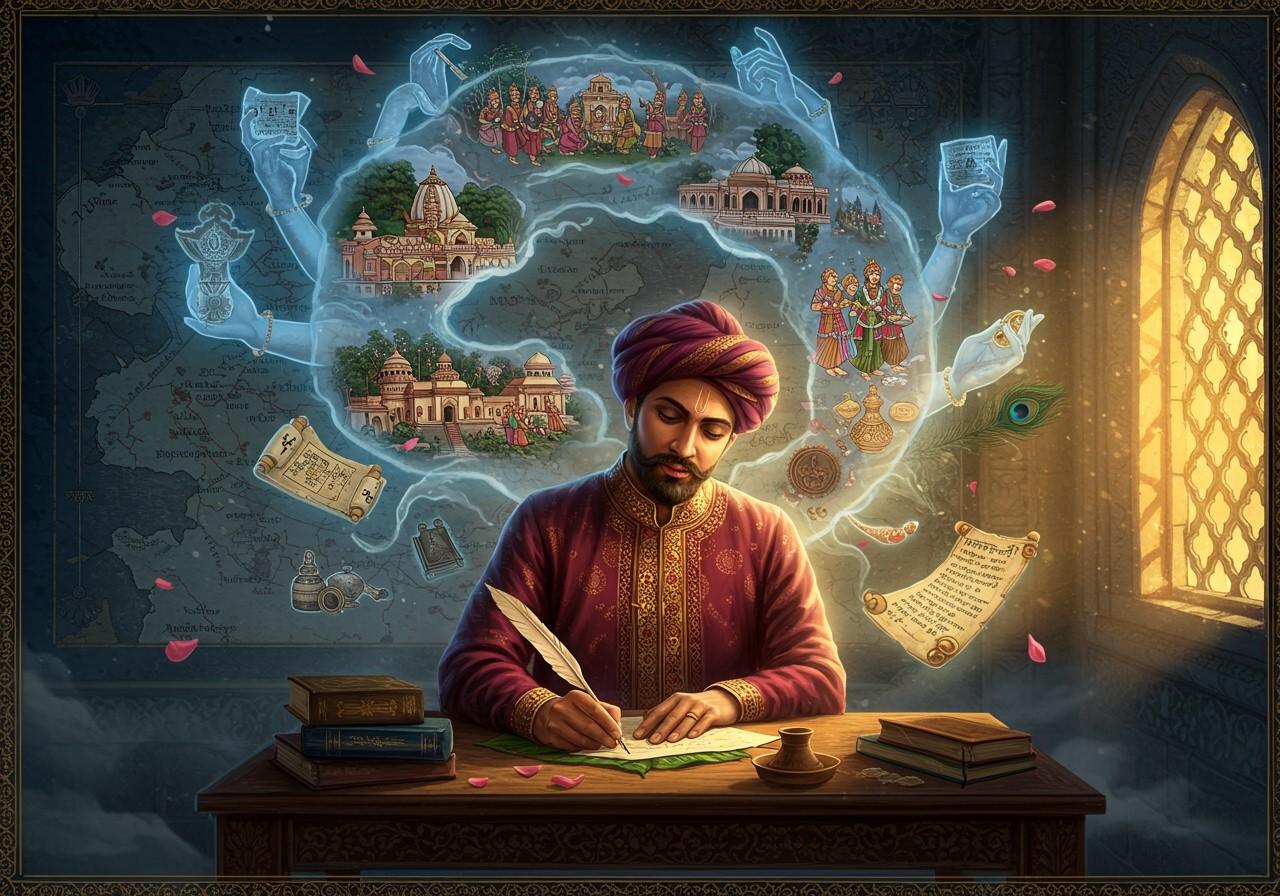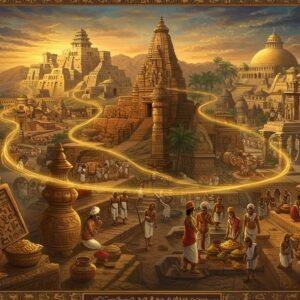
Kalhana, a celebrated scholar from 12th-century Kashmir, left an indelible mark on literature and historiography with his magnum opus, the ‘Rajatarangini’. This epic stands as a pioneering historical narrative in Indian literature. Kalhana’s meticulous chronicle of Kashmir’s history masterfully blends historical accuracy with poetic expression. This article explores Kalhana’s enduring influence on literature and historiography, emphasizing his pivotal role in shaping historical narratives.
Kalhana’s Rajatarangini: A Groundbreaking Historical Chronicle
The ‘Rajatarangini’, meaning ‘River of Kings’, is a Sanskrit epic poem chronicling Kashmir’s history from its mythical beginnings to the 12th century. Comprising eight books, or ‘Tarangas’, each meticulously details the reigns of various kings. Kalhana’s rigorous approach involved consulting earlier texts, inscriptions, and oral traditions. This seminal work, written in the 12th century, offers a captivating blend of poetic storytelling and historical accuracy, reflecting the socio-political and cultural milieu of his era. It provides invaluable insights into governance, religious practices, and societal norms of ancient Kashmir.
Kalhana’s systematic methodology in documenting history earned him the esteemed title of the ‘Father of Indian History’. He prioritized credible sources and critically examined the biases of earlier chroniclers. This meticulous approach laid the groundwork for subsequent historiographical practices in India. Kalhana’s objective analysis of events, interwoven with a poetic narrative, established a benchmark for integrating literary artistry with factual history. His ‘Rajatarangini’ has profoundly impacted Sanskrit literature, inspiring poets and writers across generations. Unlike many of his contemporaries, Kalhana employed a systematic approach to recording history, which has captivated scholars and readers. Modern interpretations of “Rajatarangini” continue to explore and redefine its historical significance.
Kalhana’s Literary and Cultural Impact
Beyond its historical significance, the ‘Rajatarangini’ holds immense literary value. Kalhana’s writing style, characterized by vivid imagery and eloquence, continues to captivate readers today. His narrative technique of interweaving myth with history has profoundly influenced storytelling traditions across the Indian subcontinent. The ‘Rajatarangini’ not only reflects the richness of Sanskrit literary tradition but also serves as a wellspring of inspiration for future literary endeavors.
In contemporary times, the ‘Rajatarangini’ remains a subject of fascination for historians and literary scholars. Kalhana’s critical historical analysis informs modern historiography, fostering a nuanced understanding of historical events. His work is frequently cited in discussions about India’s historiographical traditions, serving as a touchstone for historical writing that seamlessly blends factual accuracy with engaging narrative.
Kalhana’s ‘Rajatarangini’ transcends its role as a mere historical record; it stands as a cultural treasure, reflecting the ethos of ancient Kashmir. It offers invaluable insights into the region’s cultural practices, religious beliefs, and social structures. The chronicle serves as a significant cultural artifact, preserving Kashmir’s rich heritage and rekindling interest in its history among scholars and the general public alike.
Poojn.in: Supporting Your Exploration of Kalhana’s Legacy
Poojn.in provides a curated selection of items to enhance your engagement with the scholarly and spiritual dimensions of Kalhana’s work:
- Sanskrit Study Materials: Delve deeper into Kalhana’s writing style and historical methods with our collection of traditional Sanskrit texts and translations. We offer a variety of resources to aid your understanding of this ancient language and its literary nuances. Explore the beauty and wisdom of Sanskrit literature with Poojn.in.
- Ritual Items for Scholarly Pursuits: Create an optimal study environment inspired by ancient Indian learning traditions with our selection of brass oil lamps (diyas) and incense holders. These items can enhance focus and create a serene atmosphere conducive to learning and reflection. Immerse yourself in the traditional ambiance of scholarly pursuits with Poojn.in.Shop Now at Poojn.in
- Meditation Supplies: Enhance your focus and concentration while analyzing complex historical texts with our range of meditation cushions and accessories. These products are designed to promote comfort and tranquility during meditation, supporting your scholarly endeavors. Find inner peace and enhance your focus with Poojn.in.
- Traditional Writing Materials: Connect with the traditional methods of Sanskrit writing and study with our authentic copper and brass pens. These exquisite writing instruments offer a unique and enriching experience for those seeking to immerse themselves in the rich history of Sanskrit scholarship. Experience the timeless tradition of Sanskrit writing with Poojn.in.Shop Now at Poojn.in
Visit www.poojn.in to discover our complete collection of authentic items that support your academic and spiritual journey. We offer pan-India delivery and expert guidance on product selection through our dedicated customer service team. Note: All products are certified authentic and sourced from traditional artisans.
Contact: 91 7908548235 for product inquiries
Kalhana’s Enduring Legacy
Kalhana’s ‘Rajatarangini’ endures as a literary masterpiece, a testament to his scholarly rigor and literary prowess. His pioneering methods and insightful analysis continue to resonate with scholars today, solidifying his status as a pivotal figure in Indian historiography. His work serves as a source of inspiration for those seeking to understand the past not merely through facts, but through the lens of cultural and literary richness.
The ‘Rajatarangini’ stands as a bridge between poetry and history, offering a unique perspective on Kashmir’s past. By skillfully blending myth with meticulous research, Kalhana established a new paradigm for historical writing, influencing generations of scholars and writers. Today, his legacy thrives, inspiring those who cherish India’s rich cultural heritage. The ‘Rajatarangini’ not only recounts the past but also celebrates the spirit of Kashmir, inviting readers to delve into its vibrant history.
Kalhana’s impact extends beyond academic circles, shaping a broader understanding of India’s historical narrative. His unwavering commitment to truth and storytelling encourages us to appreciate the intricate interplay between history and culture. Through the ‘Rajatarangini’, we honor a tradition of knowledge that continues to enlighten and enrich our lives, ensuring that Kalhana’s legacy endures for generations to come. Learn more about the influence of ancient texts on Indian Culture
Understanding Kalhana: Frequently Asked Questions
Who was Kalhana? Kalhana, a prominent figure in 12th-century Kashmir, was a historian and poet renowned for his masterpiece, the “Rajatarangini,” meaning “River of Kings.” He is considered a pioneering figure in Indian historiography.
What is Kalhana’s “Rajatarangini”? The “Rajatarangini” is a historical chronicle, written in Sanskrit, documenting the reigns of the kings of Kashmir. It serves as an invaluable source for understanding the history of ancient India, particularly the Kashmir region. Explore other significant characters and life lessons from ancient epics.
What was Kalhana’s contribution to ancient Indian historiography? Kalhana’s meticulous and detailed approach to documenting history set him apart. His distinctive narrative style, blending historical facts with literary elements, established a precedent for future historians. His work reflects a systematic approach to recording history, which has captivated scholars and readers.
Why is Kalhana known as the ‘Father of Indian History’? Kalhana earned the title ‘Father of Indian History’ due to his systematic and analytical approach to historical writing, which was groundbreaking for his time. His work continues to be studied for its innovative methodology and insightful analysis.
What influence did Kalhana have on literature? Kalhana’s work transcended the boundaries of historical writing, influencing literature as well. His unique blend of poetry and prose, coupled with his engaging narrative technique, inspired generations of writers and historians. Discover the impact of other ancient Indian epics on art and literature.
How does Kalhana’s work differ from other historical texts of his era? Unlike many contemporary texts that often intertwined myths and legends with historical accounts, Kalhana’s “Rajatarangini” strived to present a more factual and chronological representation of history. Modern interpretations of “Rajatarangini” continue to explore and redefine its historical significance.
Why is Kalhana’s legacy considered so significant? Kalhana’s legacy remains significant due to his establishment of a new standard for historical writing in India. His work serves as an essential resource for understanding the history and culture of ancient Kashmir. Explore thematic explorations in other ancient Indian texts.
What are some prominent themes in Kalhana’s writings? Kalhana’s writings explore themes of power, politics, morality, and the ephemeral nature of life. These themes are intricately woven into the historical narrative, providing insights that extend beyond mere events. His exploration of these themes adds depth and complexity to his historical accounts.


